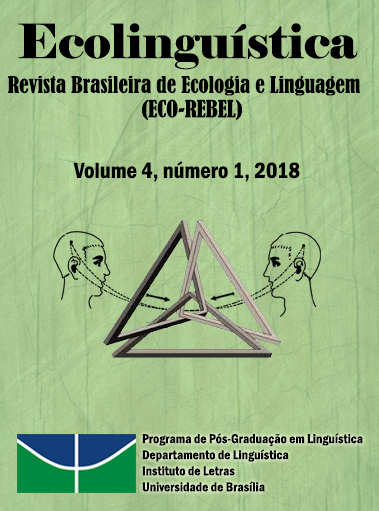Ecossistema cultural
Palavras-chave:
Ecolinguística; Linguística Ecossistêmica; Ecossistema Linguístico; Ecossistema Cultural.Resumo
O objetivo deste artigo é retomar as relações entre língua e cultura, mostrando que a primeira é parte da segunda e que ambas são parte de um ecossistema, ecossistema linguístico e ecossistema cultural, respectivamente. Pelo fato de também a cultura ser de natureza semiótica, segue-se que todos os seus componentes (materiais e imateriais) podem ser usados nos atos de interação comunicativa previstos pela parte da ecolinguística chamada de linguística ecossistêmica, que tem esse nome por ter o ecossistema biológico como ponto de partida para encarar os fenômenos da linguagem, da perspectiva da visão ecológica de mundo. Por fim, mostra que o conhecimento de pelo menos parte do ecossistema cultural é de fundamental importância na aprendizagem de segunda língua, a fim de não se cometerem gafes no país em que essa língua é falada.
Downloads
Referências
BANG, Jørgen Chr.; DØØR, Jørgen. Ecolinguística: um enquadramento conceitual. Ecolinguística: revista brasileira de ecologia e linguagem (ECO-REBEL) v. 1, n. 2, 2015, p. 65-81. Disponível em: http://periodicos.unb.br/index.php/erbel/article/view/16527/11770 (acesso: 01/11/2015).
BOOKCHIN, Murray. What is social ecology? In: Zimmermann, M. E. (org.). Environmental Philosophy: From Animal Rights to Radical Ecology. Englewood Cliffs, NJ: Prentice Hall, 1993.
CAPRA, Fritjof. Sabedoria incomum. São Paulo: Cultrix, 1995, 10ed.
COUTO, Hildo Honório do. 1981. Semiótica da cultura e tradução. In: Mattos, Delton de (org.). Estudos de tradutologia I. Brasília: Kontakt, p. 9-32.
_______. Anticrioulo: manifestação linguística de resistência cultural. Brasília: Thesaurus, 2002.
_______. Linguística ecossistêmica. Ecolinguística: Revista Brasileira de Ecologia e Linguagem ECO-REBEL, v. 01, n. 01, 2015, p. 47-81. Disponível em: http://periodicos.unb.br/index.php/erbel/article/view/15135/10836 (10/12/2015)
_______. Estudos gramaticais à luz da linguística ecossistêmica. Scripta v. 20, n. 38, 2016a, p. 26-53. Disponível em (20/11/2016): http://periodicos.pucminas.br/index.php/scripta/article/view/P.2358-3428.2016v20n38p26
_______. Comunidade de fala revisitada. Disponível em: http://periodicos.unb.br/index.php/erbel/article/view/20035, 2016b (acesso: 20/12/2016).
_______. Contato interlinguístico: da interação à gramática, 2017a. Disponível em:
http://www.ecoling.unb.br/images/contato-interlinguistico.pdf (acesso: 20/10/2017), 2ª ed. (1ª ed., 1999).
_______. Linguística ecossistêmica: um novo modo de estudar os fenômenos da linguagem. In: COUTO, Elza; DOURADO, Zilda; SILVA, Anderson; AVELAR FILHO, João (orgs.). Linguística ecossistêmica: 10 anos de ecolinguística no Brasil. Campinas: Pontes, 2017b, p. 21-43.
_______; COUTO, Elza; BORGES, Lorena. Análise do discurso ecológica (ADE). Campinas: Pontes, 2015.
ECO, Umberto. A estrutura ausente. São Paulo: Perspectiva, 1974.
FINKE, Peter. Identity and manifoldness: New perspectives in science, language and politics. In: FILL, Alwin & Peter MÜHLHÄUSLER (orgs.). The ecolinguistics reader. Londres: Continuum, 2001, p. 84-90.
GAIO, Mario Luis Monachesi. Etnicidade linguística em movimento: os processos de transculturalidade revelados nos brasileirítalos do eixo Rio de Janeiro-Juiz de Fora. Niterói: Universidade Federal Fluminense, Tese de Doutorado, 2017, 318p.
HAUGEN, Einar. The ecology of language. Stanford: Stanford University Press, 1972, p. 325-339. Também em COUTO ET AL. O paradigma ecológico para as ciências da linguagem. Goiânia: Editora da UFG, 2016, p. 57-75.
LAMB, Sydney M. Neuro-cognitive structure in the interplay of language and thought. In: PÜTZ, Martin; VESPOOR, Marjolijn H. (orgs.) Explorations in linguistic relativity. Amsterdam: Benjamins, 2000, p. 173-196.
MUFWENE, Salikoko. The ecology of language evolution. Cambridge: Cambridge University Press, 2001.
NEVES, Walter. Antropologia ecológica. São Paulo: Cortez Editora, 1996.
PEIRCE, Charles Sanders. Semiótica e filosofia. São Paulo: Cultrix, 1972.
PREZIOSI, Donald. Toward a relational theory of of culture. In: The Third LACUS Forum. Columbia, S.C.: Hornbeam Press, 1977, p. 278-286.
STAGL, Justin. Kulturanthropologie und Gesellschaft. Munique: List Verlag, 1974.
TRAMPE, Wilhelm. Ökologische Linguistik und Humanökologie. In: FILL, Alwin; Hermine PENZ & Wilhelm TRAMPE (orgs.). Colourful green ideas. Berna: Peter Lang, 2002, p. 89-101.
Downloads
Publicado
Como Citar
Edição
Seção
Licença
Autores que publicam nesta revista concordam com os seguintes termos:
Autores mantêm os direitos autorais e concedem à revista o direito de primeira publicação, sendo o trabalho simultaneamente licenciado sob a Creative Commons Attribution License o que permite o compartilhamento do trabalho com reconhecimento da autoria do trabalho e publicação inicial nesta revista.
Autores têm autorização para assumir contratos adicionais separadamente, para distribuição não exclusiva da versão do trabalho publicada nesta revista (ex.: publicar em repositório institucional ou como capítulo de livro), com reconhecimento de autoria e publicação inicial nesta revista.
Autores têm permissão e são estimulados a publicar e distribuir seu trabalho online (ex.: em repositórios institucionais ou na sua página pessoal) a qualquer ponto antes ou durante o processo editorial, já que isso pode gerar alterações produtivas, bem como aumentar o impacto e a citação do trabalho publicado (Veja O Efeito do Acesso Livre).



3.png)



